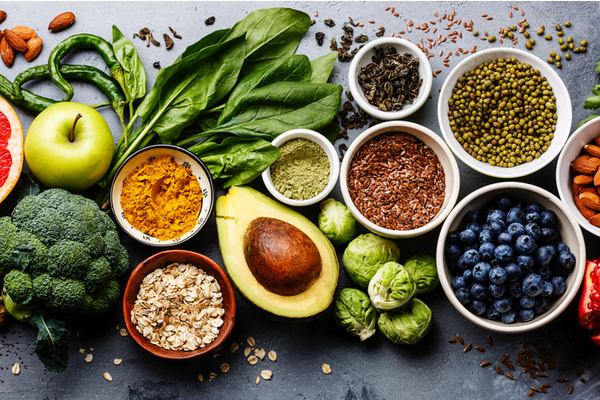Stress can affect your stomach and take away your appetite, but it can also work in reverse: what you eat can contribute to stress. For Stress Awareness Month, Lisa and Alana Macfarlane of The Gut Stuff, along with their team of experts, explain how stress affects your gut and what to eat to show your gut some love.
Research published by Ordinance Survey earlier this year showed a worrying increase in mental health conditions. One in five were experiencing some form of depression (doubling from one in 10 beforehand). Feeling under stress or feeling anxious was the most common manifestation of depression, reported by 84.9 per cent of people.
And it’s no coincidence that stress and the gut are connected, as there is even a name for the connection: the gut-brain axis.
Stress and the gut-brain axis
The ‘gut-brain axis’ describes the back-and-forth communication between the central nervous system and the gastrointestinal tract. The GI tract uses signalling hormones and other messengers to manage what we do and how we feel daily.
A key player in this set up is your gut microbiome: the community of microorganisms, mostly bacteria, living in your gut. These clever microbes affect the messages sent to your brain, helping dictate how you feel. There’s a constant dialogue between them, too.
In recent years there has been a surge of research looking at this connection. While we still have a long way to go towards fully understanding the process, we know that chronic stress can change your microbes and create an environment that favours unhelpful bacteria.
People suffering from depression, stress and anxiety have been found to have less microbial diversity. Add to that, specific bacteria may also increase the risk of depression and anxiety.
Stress and the body

Your body doesn’t distinguish between perceived or actual stress. With both, it produces the hormone cortisol. Think of cortisol like an air traffic controller, diverting, slowing or stopping metaphorical planes. Here are just a few things cortisol does:
- Diverts blood away from the gut to your muscles (to fight or run from your stressor).
- Slows the production of saliva, meaning the enzymes that break down food are reduced, impairing digestion.
- Decreases prostaglandins, which protect your stomach from acid, so you might have a more sensitive tummy when you are stressed.
- Slows digestion or causes sudden evacuation (diarrhoea), which might mean you aren’t absorbing nutrients as well.
- Down-regulates your immune system, 70 per cent of which is found in your gut.
- Causes the stomach and oesophagus to spasm.
Your body can cope with these things in the short term but prolonged stress will have an impact. It means food won’t be digested as well, which can play havoc on the delicate ecosystem of microbes in your gut.
Eat more plants to reduce stress

Research shows that if you eat 30 or more different plant-based foods a week, you’ll have a more diverse mix of gut microbes than those who eat less than 10.
A diverse microbiome supports the production of ‘happy hormone’ serotonin, 90 per cent of which is found in the gut. Serotonin is sent to your brain, lifting your mood, calming you down and essentially helping you feel more cheery.
Try these tips for getting your 30 a week:
- Use mixed bags of salad
- Use each colour of pepper (each counts separately!)
- Buy a bag of mixed frozen veg.
- Use nut and seed mixes to sprinkle on salads
- Use a variety of pastas, such as lentil, pea and chickpea.
Stat: 90%… of serotonin, the happy hormone, is made in your gut.
Help manage stress by adding some of these gut-friendly foods to your diet
Sauerkraut
Raw, unfermented sauerkraut is teaming with bacteria, of the good kind! The live nature of ferments means it takes some time to get used to start out with small amounts of sauerkraut – a teaspoon per meal – to get used to it and see how you find it.
Polyphenols
Polyphenols are protective compounds found in lots of plant foods and are typically in higher quantities in brightly coloured fruit and veg. Your gut microbes convert polyphenols from plants into something your body can use.
They then have antioxidant properties and act as mini cheerleaders for your microbes, helping them perform at their best. Colourful vegetables, fruit, tea, coffee, dark chocolate, legumes and olive oil are all good sources.
Fibre
You’ll get this if you eat plenty of the above! But most of us don’t get enough fibre per day – you need at least 30g. Fibre feeds your gut bugs and also increases the bulk and softness of your poo, which helps keeps you regular.
Load up on veggies and fruits in their whole forms, including skins where edible. Nuts and seeds and legumes are also great. Start off slow, with an extra portion of fibre a day and then gradually increase.
Kimchi
This originates from Korea dating back more than 3,000 years, where salt was used as a method of preserving vegetables during the cold winter months. It typically contains cabbage and flavourings such as garlic, ginger, and chilli peppers. Like sauerkraut, it contains live bacteria. Start slow and build up.
Kombucha
If you’re into fermented foods, refreshing tonics such as kombucha will appeal. It’s made using live cultures referred to as ‘grains’ or a ‘SCOBY’. The cultures feed off the sugar in the ferments, transforming to a small amount of alcohol, acetic acid and carbon monoxide while the microbes multiply. It’s are a great alternative to fizzy preservative-laden drinks.
Kefir
This is another fermented drink, usually made with dairy milk although you can get it made with non-dairy milk alternatives and even water. Kefir grains are added to milk and water and ferment either naturally present sugar or added sugar (usually in water kefir), the by-products turn it sour and slightly fizzy.
It’s an acquired taste but worth it for the extra microbes you’ll be consuming. The kefir grains digest most of the lactose (milk sugar) making it easier to digest for a those who have trouble with lactose.
Sourdough
A traditional sourdough is a live culture of flour and water, referred to as a ‘mother’ or ‘starter’ containing a blend of bacteria called lactobacillus and yeast. These bacteria produce beneficial by-products to look after your gut.
The minerals iron, magnesium and zinc are also made more available by the fermentation process. A healthy sourdough starter can be kept for ages with minimal maintenance, ready to have on hand for whenever you are ready to bake.







